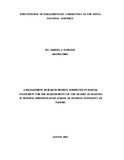| dc.description.abstract | There is limited literature on the subject of measuring effectiveness of legislative bodies and/or their committees. Further, there are numerous general statements on the importance of the work done by the committees of the Parliament, but no one has yet embarked on the more demanding task of making the careful and detailed assessment necessary to determine their true value. Perhaps this can be explained partially by the difficulty of determining exactly how committee effectiveness is to be defined and measured. The Liaison Committee of the House of Commons recently recognized this problem when it for the first time assessed the effectiveness of Commons committees.
The Liaison Committee had first to establish the criteria on which such an evaluation could be made. In broad terms, it determined that the measure of a committee's effectiveness is the extent of its influence on the actions or behaviour of the government. This being said, the task of assessing committee effectiveness is still not simple, as the Liaison Committee itself admitted. The committee provided no empirical evidence to back its conclusions and admitted in its reports that standards of effectiveness varied according to the observer (Kuntz, 2002). This paper investigated the effectiveness of parliamentary committees at the Kenya National Assembly (KNA).
The paper consequently aims to address the following research question: 'How effective are parliamentary committees at the Kenyan National Assembly?' A case study was undertaken focusing on twelve (12) parliamentary committees namely: the Public Accounts Committee (PAC) and Public Investment Committee (PIC); Departmental Committee on Health; Departmental Committee on Administration and National Security; Departmental Committee on Justice and Legal Affairs; Departmental Committee on Finance; Select Committee on Constituency Development Fund; Procedure and House Rules Committee; Budget Committee; Local Authorities and Funds Accounts Committee; Departmental Committee on Defence and Foreign Relations; and, the Departmental Committee on Agriculture, Livestock and Co-operatives.
The study utilized interviews to collect primary data from twenty four (24) committee members, that is, the chair person and one (1) other committee member from each of the mentioned parliamentary committee. However, only eighteen (18) of the respondents were interviewed. The data was then analyzed using content analysis and the information was then systematically presented using the Collegiate Project Services (2006) eight factor scores. The Research findings illustrated that all the committees' generally scored well on the environment factors (Leadership Support and Structure). However, with regard to the process factors (Focus, Communication, Leadership Sharing, and Group Processes) and outcome factors (Results and Morale) the committees' did not score that well.
This indicates that KNA has generally provided a conducive environment for the committees but, the process factors, mainly communication and leadership sharing, have led to low morale/ownership and poor results among most committees. Therefore, the overall effectiveness of parliamentary committees at the KNA could be enhanced by addressing the committees' process factors leading to better results. Consequently, the researcher concluded that most parliamentary committees in the KNA are well structured and receive relatively good leadership support from the PSC staff.
It can be further concluded that the committee processes and focus is equally good, however, poor leadership sharing, communication and morale/ownership has compromised the effectiveness of the parliamentary committees leading to poor results among most of the committees. The researcher then strongly recommended that KNA strengthens its oversight role in government by ensuring that the findings and recommendations of parliamentary committees are implemented and availed to all stakeholders, especially-the public at large. This would ensure that the effectiveness of the committees is not compromised as well as enhance the contribution of parliamentary committees within the KNA, government and country (public). | en_US |

